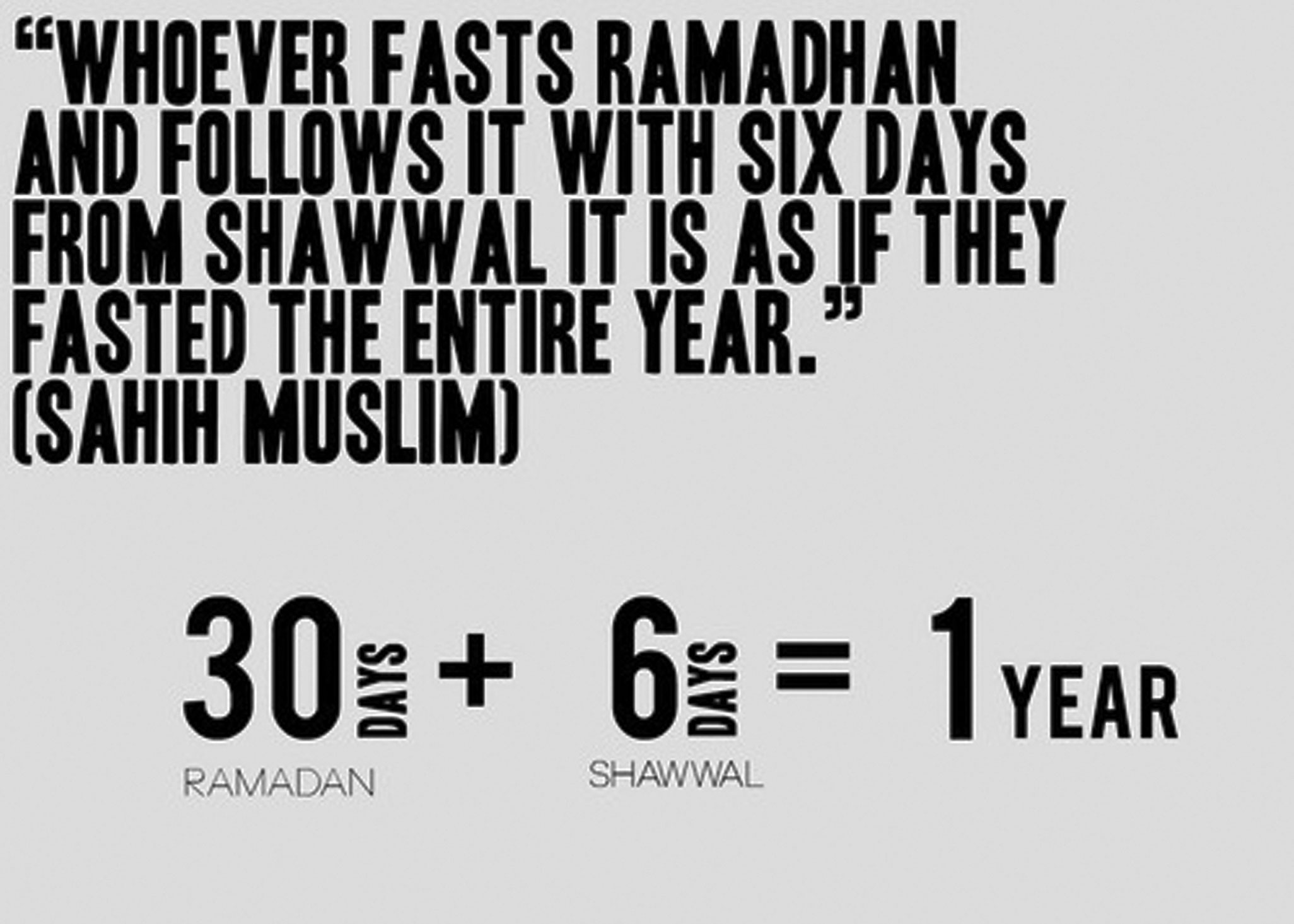With the end of Ramadan comes the beginning of nostalgia. We count down the days until next Ramadan, and often feel at a loss.
While Ramadan is a special time, there are ways to incorporate the blessings of fasting on regular basis. The Prophet, peace be upon him, would fast, not continuously, but periodically, throughout the year. Fasting is another act of worship, and its reward is one promised by Allah – so one can only begin to imagine the magnitude of blessings.
While one can fast any time of the year, there are days specifically mentioned that carry more reward should one partake in fasting.
1. 6 Days in Shawal
The month of Shawwal immediately follows the month of Ramadan and offers a great opportunity to continue the good habits gained in Ramadan. It can be difficult to switch eating habits so quickly after Ramadan, so many find it fruitful to fast intermittent days after the end of Ramadan, and take advantage of the blessings.
Abu Ayyoob reported that the Messenger of Allah, peace and blessings be upon him, said: “Whoever fasts Ramadan and follows it with six days of Shawal, it will be as if he fasted for a lifetime” [Muslim].
2. Mondays and Thursdays
Aishah narrated: “The Prophet used to try to fast on Mondays and Thursdays” [Tirmidhi, Nasai, and Ibn Majah].
Fasting twice a week is not only Sunnah, or tradition of the Prophet, but in fact is said to be a healthy routine for your body. There are studies that show that intermittent fasting is an opportunity for the body to cleanse itself of waste and to increase one’s metabolic rate, helping burn more calories.
3. Fridays
Fridays are the most blessed day of the week. Rewards of good deeds are multiplied, however, one should not fast Friday alone, but in combination with Thursday or Saturday.
Narrated Abu Huraira: I heard the Prophet, peace be upon him, say: “None of you should fast on Friday unless he fasts a day before or after it” [Bukhari].
4. The White Days (Ayam Al-Beedh)
Abdullah ibn Amr ibn al-Aas said: The Messenger of Allah, peace be upon him, said to me: “It is sufficient for you to fast three days every month, because for every good deed you will have (the reward of) ten like it, so that will be like fasting for a lifetime” [Bukhari and Muslim].
The white days refer to the 13th, 14th, and 15th of the lunar calendar, so it may not be the same days each month of the solar Gregorian calendar. The days are named as such due to the moon being full and the light it reflects is at maximum. It’s not necessary to fast all three days.
5. Day of Ashura – 10th of Muharram
The 10th of
MuharramMuharram is the first month of the Islamic calendar. It is one of the four sacred months of the year when warfare is banned. It precedes the month of Safar. The tenth of Muharram is known as Ashura, an important day of commemoration in Islam. More, the first month of the Islamic calendar, commemorates the day Allah saved Prophet Musa, peace be upon him, and his followers from their adversaries. There’s no day better to fast in after Ramadan than
MuharramMuharram is the first month of the Islamic calendar. It is one of the four sacred months of the year when warfare is banned. It precedes the month of Safar. The tenth of Muharram is known as Ashura, an important day of commemoration in Islam. More.
Ibn Abbas was asked about observing of fast on the day of
AshuraThere are certain days in the year which are more virtuous than others, one such day is the 10th of Muharram which is known as the Day of Ashura, falling in the first month of the Islamic lunar calendar. It is believed the Day of Ashura commemorates various historical events, including the day when Prophet Moses (Musa) and the Israelites were saved from the tyranny of Pharaoh in Egypt. Prophet Muhammad (SAW) observed the Jews fasting on this day to commemorate their deliverance, and he recommended Muslims to also fast. The Prophet (SAW) said: “We are closer to Musa than you are,” and advised Muslims to fast ‘Ashura’ either for three days (ninth, tenth, and eleventh); two days (ninth and tenth); or just the day of Ashura itself. In Islam, Ashura is a solemn occasion, as it marks the martyrdom of Imam Hussein ibn Ali, the grandson of Prophet Muhammad, along with his family members and companions, in the Battle of Karbala in 680 CE. More, whereupon he said: “I do not know Allah’s Messenger, peace be upon him, singling out any day’s fast and considering it more excellent than another, except this day (the day of
AshuraThere are certain days in the year which are more virtuous than others, one such day is the 10th of Muharram which is known as the Day of Ashura, falling in the first month of the Islamic lunar calendar. It is believed the Day of Ashura commemorates various historical events, including the day when Prophet Moses (Musa) and the Israelites were saved from the tyranny of Pharaoh in Egypt. Prophet Muhammad (SAW) observed the Jews fasting on this day to commemorate their deliverance, and he recommended Muslims to also fast. The Prophet (SAW) said: “We are closer to Musa than you are,” and advised Muslims to fast ‘Ashura’ either for three days (ninth, tenth, and eleventh); two days (ninth and tenth); or just the day of Ashura itself. In Islam, Ashura is a solemn occasion, as it marks the martyrdom of Imam Hussein ibn Ali, the grandson of Prophet Muhammad, along with his family members and companions, in the Battle of Karbala in 680 CE. More) and this month, meaning the month of Ramadan” [Muslim].
6. Arafah – 9th of Dhul-Hijjah
For those not performing Hajj, fasting the first nine days of Dhul-Hijjah (the 10th being Eid Al-Adha) is recommended. In particular, the Day of Arafah, being the 9th of Dhul-Hijjah, is highly recommended.
Abu Qatadah reported: The Messenger of Allah, peace be upon him, was asked about the observance of fasting on the day of Arafah. He said, “It is an expiation for the sins of the preceding year and the current year” [Muslim].
7. Shaban
The month of Shaban precedes the month of Ramadan, and is an ample opportunity to prepare for Ramadan, both spiritually and physically.
It was narrated that Aishah reported that the Prophet liked the month of Shaban more than any other month as far as supplementary fasting is concerned [Bukkhari].
General voluntary fasts
Aside from the days on which it is forbidden to fast – the two days of Eid, the three days of Al-Tashreeq (11th, 12th, 13th of Dhul-Hijjah), the Prophet, peace be upon him, would fast intermittently throughout the year. Based on one’s capacity, fasting is a beloved act of worship. May Allah accept from us the efforts put forth this past Ramadan and allow us to continue our good habits.
Post Disclaimer | Support Us
Support Us
The sailanmuslim.com web site entirely supported by individual donors and well wishers. If you regularly visit this site and wish to show your appreciation, or if you wish to see further development of sailanmuslim.com, please donate us
 Donate
Donate
IMPORTANT : All content hosted on sailanmuslim.com is solely for non-commercial purposes and with the permission of original copyright holders. Any other use of the hosted content, such as for financial gain, requires express approval from the copyright owners.

 Sri lanka Muslims Web Portal Sri Lanka Muslims News Center
Sri lanka Muslims Web Portal Sri Lanka Muslims News Center
 Donate
Donate


